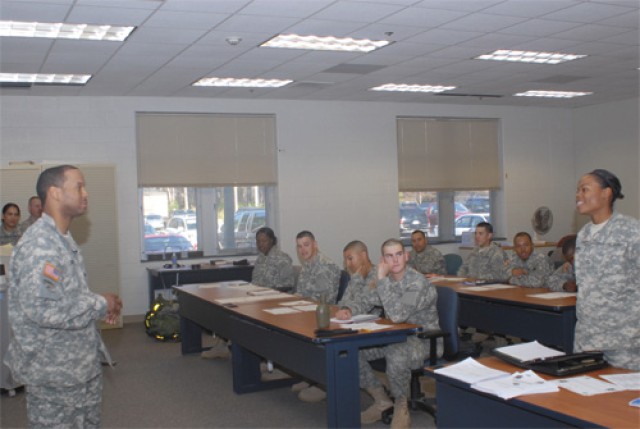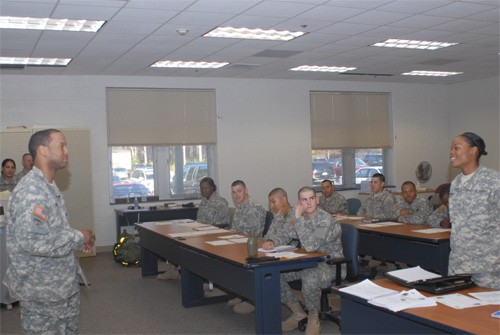
FORT EUSTIS, Va. (March 26, 2009) -- An instructor for Soldiers during the day turns into a father and husband by night and a mentor to youth on weekends.
Sgt. Lawrence Taylor Jr., an instructor for the cargo specialist course on Fort Eustis, gets an early start to his week, waking up between 4 and 4:30 a.m. Monday mornings to get ready for physical training. When PT ends around 6:30 a.m., his attention turns toward preparation for his students when class begins at 8:30 a.m.
Taylor, a former infantryman with nearly 16 years of Army service, teaches Soldiers of E Company, 71st Transportation Battalion, through an array of simulators in Building 839 (Cargo Handling Divsion) as well as on site at 3rd Port.
Taylor, who has also worked under forward support and ordinance branches, decided about half way through his career in the infantry that a change was necessary. Injuries were creeping in, a marriage and family was forming, and finding the best way to get promoted the fasted became more and more of a priority - prompting a reclass into the cargo specialist military occupational specialty.
"It was quite difficult at first because I got used to that lifestyle," Taylor said of leaving the infantry. "This MOS is more maintenance-consuming. It's not so much the physical stuff. It's more about preparation."
He said in the infantry the tempo was faster and he was constantly going 120 percent. After eight or nine years of that lifestyle, Taylor sought a change.
"I liked the transition because my body was really getting beat up," Taylor said. He jokingly said he had broken almost every bone in his body.
"The transition was at the right time," he added. "It helped add longevity to my career as a Soldier that I might not have had if I stayed on ground time (infantry)."
Taylor said changes have not only extended his career, but has also made him more well-rounded.
"I think the diversity has actually made me a better Soldier," he said. "Now I know where to find answers for technical questions, military bearing, disciplinary problems I might encounter and to keep myself knowledgeable on things that change as the Army grows."
He said the technical stuff was a big hurdle for him because he didn't always like to look through manuals and constantly have to read. When he took the time to sit down and read, it helped him with his current job.
However, Taylor also has a strong desire to see improvement from others. For the past year, he has been part of the Genesis Outreach Program, headed by its founder, Coach Donald E. Kee Jr., who holds weekend basketball court sessions at the Y.H. Thomas Community Center in Hampton.
"I stumbled upon it and thought it was a great thing," Taylor said. Although Kee is a basketball coach and mentor to youth of the Genesis Outreach Program, the group also helps young boys with educational tools such as reading, math, English, science, computer labs as well as a "power hour" where members of the program just talk to the youth about what's going on in their lives and why they seem to think the only opportunity to do something positive is to be part of a gang or on the streets, which is not going to get them anywhere, Taylor said.
As Kee was struggling to get support for the program he's ran for 20 years, Taylor brought members of an unofficial basketball team he created at Fort Eustis to help Kee run the program. They decided to go down to Hampton and do some scrimmages games.
"The guys had fun," Taylor said. "They had a chance to talk to the kids about military experiences. The youth, ages 8 to 18, are sometimes separated into smaller age groups because of the influence the older youth have on the younger.
"What I realized is if an 8 year-old sees a disruptive 16 year-old, they mimic their behavior," Taylor said. "It can start a pattern at age 8 of him being a disciplinary problem. For us to be there and have a chance to keep that from happening is an awesome feeling." The difference Taylor and the other members of the youth program makes is also noticed by his co-workers.
"Most people go home and relax and let their guard down, but he goes and does something that's even tougher than what he does here," said Sgt. 1st Class Patrick McGrath, cargo specialist instructor team chief. McGrath said he does some pretty remarkable stuff at work, but because of all he does in his off-duty time, he probably comes to work to relax.
One of his bigger off-duty challenges is getting the youth to open up to him.
"It's amazing when you get the kids in by themselves and they're like 'yes coach, no coach' and as soon as the other guys come in it's like they're trying to prove themselves," Taylor said. "You don't have to prove anything to anyone, but yourself. Be who you are. Don't let the outside environment change the beautiful person inside of you. Some guys want to be tough and they don't want to talk around anyone else." Taylor said they get through and have helped saved a lot of guys from trouble.
"We use basketball as a catalyst to get them off the street," Taylor said. "Once we get them in the gym, we talk to them and show them that someone is there to help them and care for them. The program's motto is "Be a Part of Something Bigger."
About a month ago, the program held an event called "757 versus Gang Violence" and were able to bring in big-name former local professional athletes such as Alonzo Mourning, Bruce Smith and Joe Smith as advocates against gang violence in the Hampton Roads area.
"We had a lot of notable people come out and help us out with this," Taylor said. "That was pretty awesome."
The program goes to great lengths to get their messages across. If it's not athletes, it's specialists that have been brought in to talk to the kids. Taylor said they even bring up general information about what deployments are like.
"We give them a sense of what it's like to not having clean running water or air conditioning," Taylor said. He said the fast food thing really killed them as he was telling the youth about Meals Ready to Eat.
"We brought them a few MREs and let them sample them," Taylor added. "They loved them, but when you eat them for nine straight months, that's another story."
Taylor admits sometimes he's tired on weekends and he talks to his wife, Cherie, about the worries of driving through tough parts of Hampton Roads. He also said it's become easier now that the kids in the neighborhood have gotten to know Taylor and the other mentors.
"All we're doing is trying to make a difference," Taylor said. "I get the drive from my wife. She looks me right in the eye and says 'you're the one who said you wanted to do this so get up and do it.' So I give her a kiss on the forehead and go out the door."
Taylor said he has recently started taking his sons Montez, 19, Delonte', 17, and Aaron, 15, to the program because they haven't had to experience half of what some of the young men have in their lives.
"It's an eye opener for them, too," Taylor said. "They appreciated more the 110 percent legwork my wife and I put in and provide for them so they don't have to be in that situation. They hear stories from the kids about how their buddy got shot or robbed the other day."
Taylor said another reason why he brought his sons with him is because he estimates that about 80 to 90 percent of the parents of the kids in the program (ranging from about 60 to 120 depending on the day) are so consumed with trying to be successful with work, that they lose out on family time.
"I started thinking about that with my own sons," Taylor said.
Taylor said he wants the youth, his three sons and daugther, Diamond, 10, to know how to survive in the real world.
"They're smart, they know how to survive in the street," Taylor said of the youth in the program. "What were trying to do is prepare them to be able to survive in Corporate America because that's where we're going. It isn't about what you know in the street, it's about what you can apply at a job and put down on paper to get the job - the experience to work in a professional environment."
He said mentoring the kids is fun because something new happens every week. The program now has enough support to where they provide help to the kids on shifts, but the group continues to seek more help. There are also parents who come in for assistance and to get training.
"It's not just the kids, we're helping," Taylor said. "The parents are hungry too. "It's been an eye-opening experience."

Social Sharing